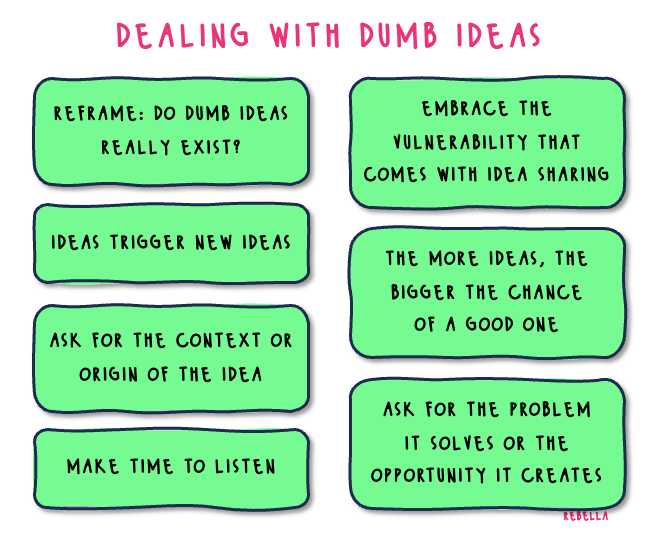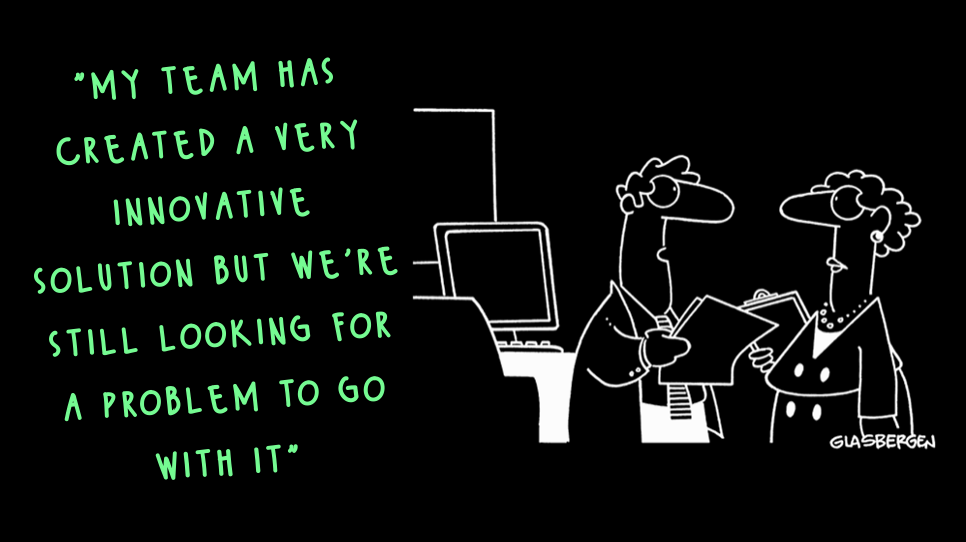
dr rebel: the rebel in my team always comes up with dumb ideas. what can i do about that?
often, managers (and co-workers) complain that the rebel in their team brings dumb and useless ideas to the table. they get annoyed and try to silence the rebel, who becomes cynical. now, everyone gets frustrated and team morale drops.
there are two ways to prevent this from happening. first, by reframing ‘dumb’ ideas, you learn to embrace any idea. and second, if you teach your team to provide more information about the idea, you better understand its rationale.

let me first share my thoughts on dumb ideas:
#1: embrace the vulnerability that comes with idea sharing. it takes guts to voice your thoughts and ideas, let alone bring up a crazy or unpolished idea. being vulnerable in the workplace is not self-evident; be happy and cherish that people feel safe in your team.
#2: reframe: do dumb ideas really exist? what is a dumb or absurd idea anyway? according to the dictionary, the definition of absurd is completely ridiculous; not logical and sensible. when we use the phrase ‘that’s an absurd idea’, we mean that the idea is illogical or ill-considered, and it doesn’t make any sense. and there is the rub: this judgment is based on the current, known frame of reference. however, innovation mostly comes from a fascination with the weirdness of how things are done, which often leads to surprising insights. something we always take for granted has suddenly turned upside down. and if the change is too big, the idea is quickly dismissed as stupid or absurd. but the truth is, the day before something is a real breakthrough, it is often a crazy idea.
#3: the more ideas, the bigger the chance of a good one. the more ideas, the bigger the chance you’ll come up with a brilliant one. this is a simple yet powerful law.
#4: ideas trigger new ideas; even (or especially) the dumb ones. a dumb idea may trigger someone else to come up with a brilliant one. perhaps a specific element of an idea is valuable and combines very well with the feature of another idea. it is said that most ideas are a merger of two or more existing ideas.
to better understand the rationale of ideas, these are the three things i often say to the teams i lead:
#5: ask for the problem it solves or the opportunity it creates. whenever someone brings up an idea, ask them to share the problem it solves or the new opportunity it creates. this will help people to give a little more thought to their ideas.
#6: ask for the context or origin of the idea. ask people also to share the context or origin of their idea. many great ideas come from analogies – ideas successfully implemented in another environment, e.g. a different industry or even nature. this shows that there lies great potential in the idea.
#7: make time to listen. listen with intent and if someone brings up an idea but you don’t have time for it at that very moment, don’t step over it, but propose having a conversation about it later. make it specific, like: “i would love to talk about it this afternoon. would 3:30 pm work for you?” (if you don’t make it specific, but only suggest talking about it later, people believe the idea is disregarded!).

do you have a burning question for dr rebel?


